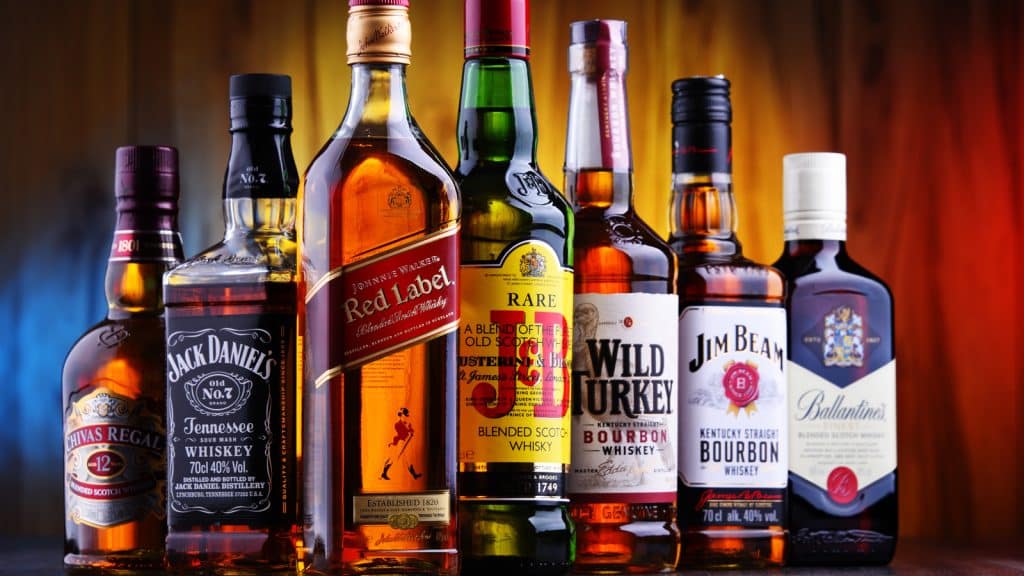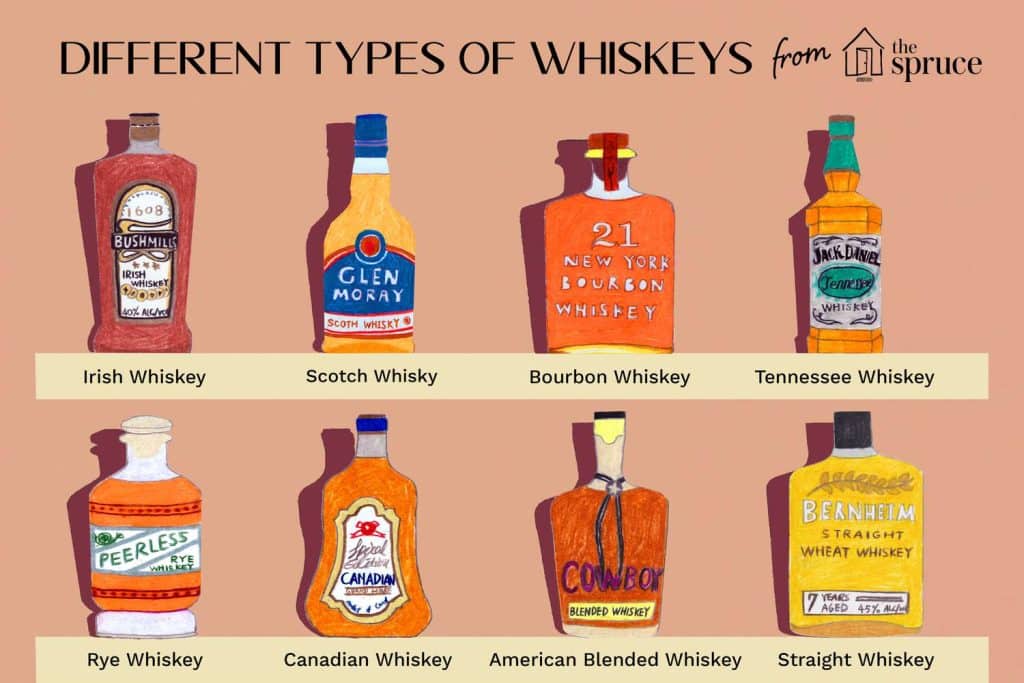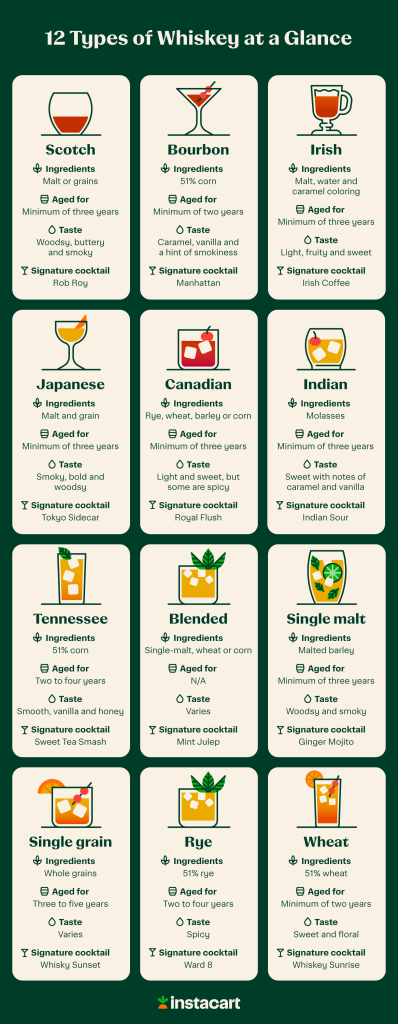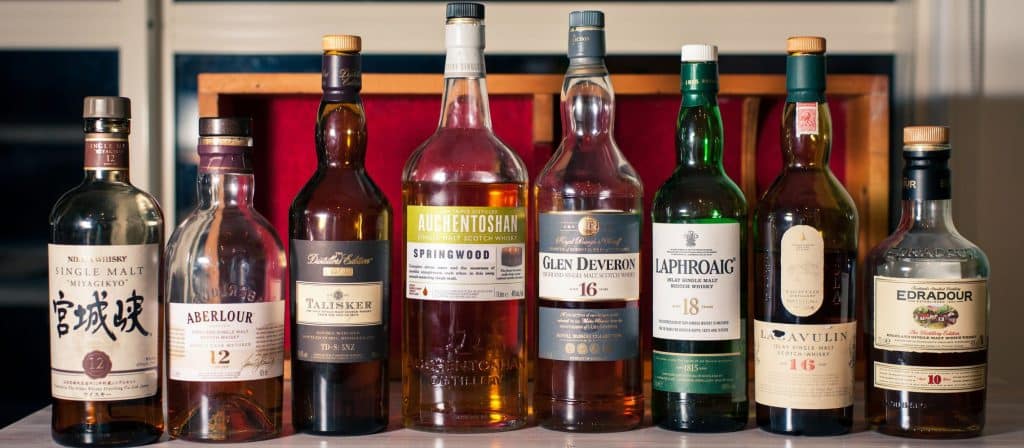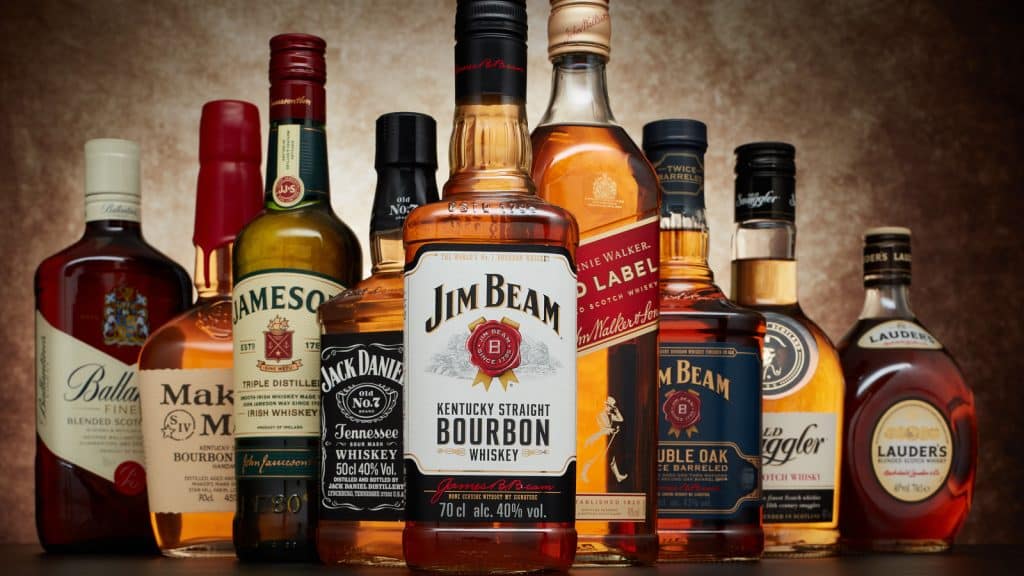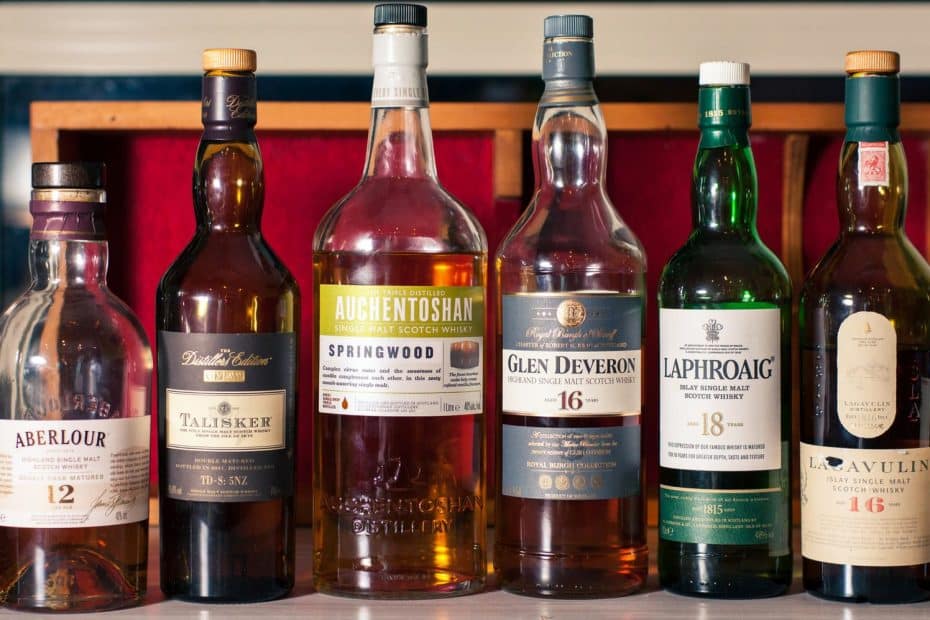Well, if you’ve ever found yourself pondering the world of whiskey, you’re in for a treat. In this article, we’re going to take a delightful journey through the basic types of whiskey. From the smooth and mellow Scotch to the robust and flavorful Bourbon, we’ll explore the distinctive characteristics that set each type apart. So, sit back, pour yourself a dram, and let’s embark on a whirlwind tour of whiskey wonders. Cheers!
1. Scotch Whisky
Scotland is known worldwide for its exceptional whiskies, and Scotch whisky is a true gem in their crown. There are several types of Scotch whisky, each with its own unique characteristics and production methods. Let’s explore the different varieties in detail.
1.1 Single Malt Scotch Whisky
Single malt Scotch whisky is made from 100% malted barley and produced at a single distillery, using pot stills. It is known for its rich and complex flavors, with notes of malt, fruit, spice, and sometimes a hint of peat smoke. Each distillery has its own distinct style and flavor profile, making single malt Scotch a fascinating and diverse category.
1.2 Blended Malt Scotch Whisky
Blended malt Scotch whisky, formerly called “vatted malt,” is a blend of single malt Scotch whiskies from different distilleries. Unlike blended whisky (which we’ll discuss later), blended malt only includes malts and does not contain any grain whisky. This type of whisky exhibits a wide range of flavors, as it combines the unique characteristics of multiple distilleries.
1.3 Single Grain Scotch Whisky
Single grain Scotch whisky is made from various grains, such as corn, wheat, or barley, and produced at a single distillery. It is usually distilled using continuous column stills, resulting in a lighter and smoother whisky. Single grain Scotch whiskies often provide a canvas for the maturation and cask influence, showcasing distinct flavors of vanilla, toffee, and spice.
1.4 Blended Grain Scotch Whisky
Blended grain Scotch whisky combines multiple single grain whiskies from different distilleries. This category allows for greater creativity in flavor profiles, as distillers can experiment with grains and aging techniques. Blended grain whiskies tend to be light, smooth, and versatile, making them suitable for both sipping and mixing in cocktails.
1.5 Blended Scotch Whisky
Blended Scotch whisky is a combination of both malt and grain whiskies. It is the most popular type of Scotch whisky, enjoyed by whisky enthusiasts and casual drinkers alike. Blended whiskies offer a balanced and approachable flavor profile, often characterized by notes of fruits, cereals, and gentle spices. They make for excellent everyday drams that can be enjoyed neat, on the rocks, or mixed into cocktails.
1.6 Cask Strength Scotch Whisky
Cask strength Scotch whisky is bottled directly from the cask without any dilution, typically at a higher alcohol by volume (ABV) than other whiskies. This results in a powerful and intense spirit, as it retains the flavors and aromas in their purest form. Cask strength whiskies are highly sought after by whisky enthusiasts who enjoy a robust and full-bodied drinking experience.
This image is property of www.tastingtable.com.
2. Irish Whiskey
Ireland’s whiskey heritage dates back centuries, and Irish whiskey has gained international recognition for its smooth and light character. Let’s explore the main types of Irish whiskey.
2.1 Single Pot Still Irish Whiskey
Single pot still Irish whiskey, also known as pure pot still, is unique to Ireland and made from a mixture of malted and unmalted barley. The distinctive production method involves triple distillation in pot stills, resulting in a rich and creamy whiskey with a full-bodied flavor profile. Single pot still Irish whiskey often exhibits notes of honey, spice, and fruit, making it a delightful choice for whiskey enthusiasts.
2.2 Single Malt Irish Whiskey
Single malt Irish whiskey is made from 100% malted barley and produced at a single distillery using pot stills. This style of Irish whiskey closely resembles its Scottish counterpart, with its smooth and nuanced character. However, Irish single malts typically have a lighter and softer profile, offering flavors of honey, vanilla, and floral notes.
2.3 Grain Irish Whiskey
Grain Irish whiskey is made primarily from grains other than barley, such as corn or wheat, along with a smaller proportion of malted barley. It is usually distilled using continuous column stills, resulting in a lighter and more approachable whiskey. Grain Irish whiskies are known for their smoothness and gentle flavors, often complemented by notes of caramel, toffee, and vanilla.
2.4 Blended Irish Whiskey
Blended Irish whiskey is a combination of both malt and grain whiskies from multiple distilleries. Like blended Scotch whisky, blended Irish whiskey offers a wide range of flavor profiles, depending on the combination of whiskies used. These whiskies are typically smooth, light, and easy-drinking, with notes of honey, citrus, and gentle spices.
This image is property of www.thespruceeats.com.
3. American Whiskey
The United States has a rich whiskey-making tradition, producing a variety of whiskies with distinct characteristics. Let’s delve into the main types of American whiskey.
3.1 Bourbon Whiskey
Bourbon whiskey is often referred to as “America’s native spirit.” It is made primarily from corn (at least 51%), along with other grains, such as rye or barley. Bourbon must be aged in new charred oak barrels and distilled to no more than 160 proof (80% alcohol by volume) before entering the barrel. It is known for its full-bodied, sweet, and rich flavors, with prominent notes of caramel, vanilla, and oak.
3.2 Rye Whiskey
Rye whiskey is produced primarily from rye grain, with a minimum requirement of 51% rye content. It can be aged in either new charred oak barrels or used barrels, allowing for different flavor profiles. Rye whiskey has a distinct and spicy character, often featuring notes of pepper, cinnamon, and dried fruits. It provides a lively and robust drinking experience.
3.3 Tennessee Whiskey
Tennessee whiskey is similar to bourbon in many ways, as it also has a high corn content and follows the same aging process in new charred oak barrels. However, Tennessee whiskey goes through an additional step known as the “Lincoln County Process,” where the whiskey is filtered through charcoal before aging. This process imparts a unique character, often described as smooth and mellow.
3.4 Corn Whiskey
Corn whiskey is made from a minimum of 80% corn and distilled to a maximum of 160 proof (80% alcohol by volume). It does not have any specific aging requirements, allowing for a more straightforward and lighter whiskey. Corn whiskey is known for its sweet and corn-forward flavors, making it an excellent base for cocktails.
3.5 Wheat Whiskey
Wheat whiskey is made from a minimum of 51% wheat, along with other grains. It shares similarities with bourbon and rye whiskey but offers a distinct and softer flavor profile. Wheat whiskey often exhibits flavors of caramel, vanilla, and baking spices, with a smooth and gentle mouthfeel.
This image is property of www.instacart.com.
4. Canadian Whisky
Canadian whisky, commonly known as “rye whisky” in Canada, has its own unique style and regulations. Let’s explore the main types of Canadian whisky.
4.1 Blended Canadian Whisky
Blended Canadian whisky is a combination of multiple grain whiskies, including barley, rye, corn, or wheat, along with a small amount of flavoring whisky. Canadian whisky regulations allow for greater flexibility in production methods, resulting in a wide range of flavor profiles. These whiskies are often smooth and balanced, exhibiting notes of caramel, toasted grains, and spices.
4.2 Single Malt Canadian Whisky
Single malt Canadian whisky is made from 100% malted barley and produced at a single distillery. While not as common as in Scotland or Ireland, Canadian single malts offer a unique and flavorful experience. They often showcase rich and fruity notes, accompanied by a hint of spice and maltiness.
4.3 Rye Canadian Whisky
Rye Canadian whisky, sometimes referred to as “rye whisky,” can contain a varying percentage of rye grain, with no specific requirement. These whiskies can be made from other grains as well, offering different flavor profiles. Rye Canadian whisky is known for its spiciness, with notes of pepper, cinnamon, and dried fruits. It has a distinct and robust character, making it a favorite among whiskey enthusiasts.
This image is property of static.londonspiritscompetition.com.
5. Japanese Whisky
Japanese whisky has gained significant recognition and appreciation worldwide for its exceptional craftsmanship and attention to detail. Let’s explore the main types of Japanese whisky.
5.1 Single Malt Japanese Whisky
Single malt Japanese whisky is produced at a single distillery, using 100% malted barley. Japanese distillers often take inspiration from Scottish whisky-making traditions, resulting in whiskies with similar flavor profiles. Single malt Japanese whiskies are known for their smoothness, complexity, and delicate balance of flavors, often including subtle notes of fruit, oak, and floral aromas.
5.2 Grain Japanese Whisky
Grain Japanese whisky is made primarily from a variety of grains, such as corn, wheat, or barley, and distilled using continuous column stills. Similar to other grain whiskies, Japanese grain whiskies tend to have a lighter and more approachable flavor profile. They often exhibit notes of vanilla, caramel, and gentle spices, making them versatile and enjoyable drams.
5.3 Blended Japanese Whisky
Blended Japanese whisky combines malt and grain whiskies from different distilleries to create a harmonious flavor profile. Japanese master blenders are renowned for their artistry in creating balanced and refined blends. These whiskies often showcase a combination of delicate and complex flavors, offering a unique and captivating drinking experience.
This image is property of www.mashed.com.
6. Other Types of Whiskey
While Scotch, Irish, American, Canadian, and Japanese whiskies command much of the global whiskey market, there are other regions that produce interesting and noteworthy whiskies. Let’s explore some of these lesser-known varieties.
6.1 Indian Whisky
Indian whisky is made using a variety of grains, such as barley, corn, or molasses, and is often aged in used bourbon barrels or oak casks. The warm climate in India accelerates the aging process, resulting in whiskies that mature more quickly than in cooler climates. Indian whiskies can offer a combination of sweetness, spice, and fruitiness, with unique regional influences.
6.2 Australian Whisky
Australian whisky has gained recognition in recent years, with distilleries showcasing their creativity and innovation. Australian whiskies are typically made from barley and aged in a variety of cask types, including Australian wine casks. These whiskies often provide a distinct flavor profile, incorporating elements of rich fruit, honey, and spices.
6.3 European Whisky
Various European countries, including France, Sweden, and Germany, have started producing their own whiskies in recent years. These emerging European whiskies often experiment with different grain varieties, cask types, and aging techniques, resulting in whiskies with unique flavors and profiles. Each country brings its own distinct approach, offering whiskey enthusiasts a diverse range of options to explore.
In conclusion, the world of whiskey is incredibly diverse, offering an array of styles, flavors, and production methods. From the rich and complex single malt Scotch whiskies to the smooth and approachable American bourbons, there is a whiskey to suit every palate. So whether you prefer a smoky, peaty Scotch or a spicy and robust rye, venture into the world of whiskey and discover the depth and artistry behind each distinctive bottle. Cheers to exploring and enjoying the delightful nuances of this beloved spirit!
